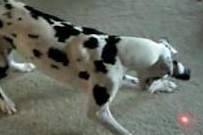Dog Breeds Blacklisted By Insurance Companies
Stanley Coren, Ph.D., F.R.S.C.
 Dr. Stanley Coren is back! This time he's toting his research about the breeds of dogs that are being blacklisted by homeowners and liability insurance. Allstate claims one third of their claims last year included a dog.
Dr. Stanley Coren is back! This time he's toting his research about the breeds of dogs that are being blacklisted by homeowners and liability insurance. Allstate claims one third of their claims last year included a dog.
While you might love your dog, the companies that carry the insurance for your house, apartment or condominium might not. In fact, your dog's breed might determine whether or not an insurance company is even willing to provide coverage for your home.
Usually in May, when the National Dog Bite Week starts, the insurance companies release their list of dogs, which they call un-insurable, excluded dog breeds and even the bad dog list.
Dr. Coren found that there were 14 breeds of dogs that seem to appear on virtually all of these lists. Some of these dogs appear on these lists following some kind of incident.
For example, virtually none had ever heard of a Presa Canario, a 120-pound dog. However, it appears on virtually all lists because in 2001 there was an incident in which a woman was killed in her apartment hallway by two of these dogs. The person who owned these dogs is now actually serving jail time. But when this happened, every list seemed to all of a sudden include the Presa Canario.
The 14 most often-blacklisted dog breeds were:
Pit Bull Terriers
Staffordshire Terriers
Rottweilers
German Shepherds
 Presa Canarios
Presa Canarios
Chow Chows
Doberman Pinschers
Akitas
Wolf-hybrids
Mastiffs
Cane Corsos
Great Danes
Alaskan Malamutes
Siberian Huskies
So if you have one of these dogs, will insurance companies not cover them? Dr. Coren advises us that it depends on the particular insurance company. Some insurance companies will not even give you a homeowner's insurance policy, while others will give you the homeowner's policy but exclude any coverage associated with the dog. Some of them may even require a larger premium.
The insurance companies do this to cover their bankroll. It so happens that more than one third of all homeowner's insurance liability claims, which were paid out in 2013, were due to dog-related incidents. This amounted to more than $490 million dollars, with the average claim costing about $30,000.
While some of the biggest biters are smaller dogs such as Dachshunds and Chihuahuas, the degree of bodily harm they inflict is very low. These bites may not be reported or even go through your insurance, so they don't make the list.
Some states have forbidden the insurance companies from blacklisting certain dog breeds. Two of these states came to Dr. Coren's mind immediately, and they were Michigan and Pennsylvania. There are ten other states that have pending legislation on the matter. They are saying that you can't deny coverage or raise premiums based on breed, but you can do it based on the dog's history.
What can you do? If you have one of these breeds that are listed, perhaps you might want to get them certified with the Good Canine Citizenship Certification and be pro-active.
Stanley Coren is the author of many books including: The Wisdom of Dogs; Do Dogs Dream? Born to Bark; The Modern Dog; Why Do Dogs Have Wet Noses? The Pawprints of History; How Dogs Think; How To Speak Dog; Why We Love the Dogs We Do; What Do Dogs Know? The Intelligence of Dogs; Why Does My Dog Act That Way? Understanding Dogs for Dummies; Sleep Thieves; The Left-hander Syndrome.
Visit Website
"HERO PERSON OF THE WEEK" - Stan Yocum, Author
 Penning thrillers isn't the only dream Stan Yocum had for his life. Author Stan Yocum is the Hero Person this week because he spends countless hours training & fostering service dogs for Canine Companions for Independence. After bonding with these awesome animals for 18-months, Stan must say "goodbye" when they go to their forever home.
Penning thrillers isn't the only dream Stan Yocum had for his life. Author Stan Yocum is the Hero Person this week because he spends countless hours training & fostering service dogs for Canine Companions for Independence. After bonding with these awesome animals for 18-months, Stan must say "goodbye" when they go to their forever home.
CCI typically breeds dogs for people who are in wheelchairs or have difficulty walking. They also provide dogs for the deaf. Stan tells us most puppies are given to handlers to raise when they are seven weeks old. The handlers are all volunteers who keep and train the puppies for 16-20 months.
During that time, the handlers will teach the dogs over 35 commands. They will also socialize them into the environments they will be involved in when they get their assigned disabled person.
After the initial training, they go back to class for another six months of intensive training with instructors from CCI. There, they will probably learn 15 more commands. By the time they are done, they will have learned over 50 commands.
Stan tells us that it is very difficult for all volunteer trainers, who have had these puppies for 18 months, to turn them back in. But what makes it easier is that they can see what these animals do for the people who receive the dogs.
So how did Stan Yocum get involved? Stan is an author and about five years ago his wife suggested that they get involved. Stan was very hesitant at first, because everyone asked him how could you possibly give up these puppies after a year and a half. Stan agreed with them. But when Stan saw the people who receive the well trained dogs, he said, "If I cannot do this and help somebody, then that's not a real good statement about what I'm willing to do for people."
While most volunteer trainers never see their dogs again, Stan has been fortunate. In fact, he was preparing for a trip to pick up a dog he raised and watch her for a month. He has maintained a good relationship with the family who received the dog for their wheelchair bound daughter. They are traveling overseas and asked Stan if he would take care of the dog while they are gone. This will be the third time Stan has watched her.
Unfortunately there are a lot of volunteer handlers that never see the dog again and stop contact with the recipient after the first few months. This is a subject that is brought up frequently with volunteer handlers. CCI explains the reason or this is that they do not want to infringe on the recipients because they do not want to expand their family. These families are dealing with issues that most of us do not understand, and don't need to deal with anything more.
So can anyone do this? If you have a lot of time! Stan says that it takes a tremendous amount of time and the dog is with you all of the time. They go everywhere with you, from department stores to restaurants and even on buses and trains. Stan says it is hard for one person to do it. He is fortunate that he has his whole family helping out. These dogs also need a great amount of exercise and you need to watch their weight. CCI doesn't want any overweight dogs!
Visit Website
What's Your Vet-iquette - How to Be a Good Veterinary Client - Dr. Debbie
 Sure you think your vet visits go off without a hitch, but do you know how to be a good veterinary client, the kind veterinarians rave about? Follow these suggestions to participate as a vital part of your pet's medical care, to ensure your pet gets the most efficient care, and to always be greeted with beaming smiles.
Sure you think your vet visits go off without a hitch, but do you know how to be a good veterinary client, the kind veterinarians rave about? Follow these suggestions to participate as a vital part of your pet's medical care, to ensure your pet gets the most efficient care, and to always be greeted with beaming smiles.
Be Prepared
Before you arrive at the office with a sick pet, know your pet's ins and outs. Without a pertinent history from you, your veterinarian may need more diagnostic tests to sleuth out the answer to the problem. That takes time and can cost you more in veterinary bills.
Expect the questions your vet is likely to ask you. Has your pet been eating? What types and brand of food do you feed him? Is there diarrhea or constipation?
Bring Evidence
Nothing is more useful to your veterinarian as seeing something with her own eyes. Bring evidence like stool samples, vomited material, and medications your pet is receiving. Has your pet chewed on some unusual plant in the backyard? By all means bring a sprig of that plant.
Document video on your smart phone. This can be immensely helpful to your veterinarian to witness behaviors that may be intermittent. I've been thankful when owners bring smart phone video of seizures, separation anxiety behaviors, and respiratory ailments.
Video eliminates misinterpretation by pet owners, and can permit a quick veterinary diagnosis. Vomiting and regurgitating may look similar, but are caused by different disorders. Pets strain to defecate with both diarrhea and constipation. Inspiratory wheezing, coughing, congestion and reverse sneezing are often described similarly by owners.
Trust Valid Resources
By all means do your research in advance of your veterinary visit. Know what questions to ask. But remember that the internet is abounding with both good and blazingly incorrect information, some based on opinions and conjecture without any sound medical basis. Pet owners who value Dr. Google's opinion over their veterinarian, who has examined their pet, could put their pet's health care in jeopardy.
Confine Your Pet
Make sure your pet is secure before entering the veterinary hospital. Don't underestimate the unpredictable things pets do in a noisy, crowded waiting room. Birds fly off shoulders landing in snack zone of nearby dogs. Dogs instigate fights, and cats flee the waiting veterinary staff's arms. Pay attention to where your pet is and don't allow your pet to approach other animals without the owner's consent. Some animals are there because they are sick, and could bite in unfamiliar surroundings.
Dogs should be on a secure leash. Flexi leashes are dangerous in the veterinary hospital allowing dogs to bolt quickly toward another dog, or to entangle limbs of humans or other animals in the waiting room. Cats and exotic pets should be secured in an appropriate pet carrier.
If you have a pet that has been or could be aggressive to veterinary staff…absolutely share that information before the visit starts. Veterinarians look out for the safety of people in their employment and appreciate a heads-up in advance to avoid potential staff injury.
 Optimize Your Face Time
Optimize Your Face Time
So now you are in the exam room with the doc, so make the most of it. Put the cell phone away and, by all means, don't waste time taking a phone call if medical staff is standing in front of you.
Avoid distractions that will limit your ability to communicate with your veterinarian. This might include a roomful of boisterous children or other pets. If possible, arrange child care or pet sitting so your sick pet gets prime attention and you don't miss any details of the visit.
Emergencies Happen
At the vet office, we recognize how valuable pet owner's time is and try to minimize the wait. But recognize that emergencies are unforeseen and create delays for other pet owners. Most folks understand that emergencies happen and are accommodating during situations as this.
But making a scene or outburst about your wait time, while the veterinary staff tends to a critical pet is just inconsiderate. Recognize that one day your pet could be in that same place and you would be appreciative that your pet's medical emergency was triaged ahead of the waiting routine appointments.
Don't Attack the Messenger
Emotions can run high when you have a sick or injured pet, but it isn't an excuse to be abusive to hospital staff. Obscene language and overly aggressive behavior doesn't help your pet get the care she needs, nor does it endear yourself to those people working hard for your pet's health.
Own Your Own Reality
Pet owners have the daunting responsibility for the health and well-being of pets in their care. That means accepting the level of veterinary care you can pursue, and recognizing choices if finances are limited. Pet insurance can help defer the cost of veterinary care, but there isn't government sponsored Obamacare for pets.
Don't blame your veterinarian for your pet's health maladies, or expect her to cover the costs of treatment. People in the veterinary field do what they do because they love animals, but they shouldn't be expected to take financial responsibility for everyone's pets. I once heard a veterinary colleague respond to an client's question, "Doc, why can't you just do my Sasha's surgery for free?" His response was, "Because my staff needs to get paid and my kids need shoes." Recognize that veterinary offices aren't lending institutions, but rather are small businesses with pressing bills, just as anyone.
Share Your Feedback
Share feedback with the hospital management about service excellence or shortcomings. Every hospital appreciates the opportunity to improve, or the chance to pat staff on the back.
Featured veterinarian known as "Dr. Debbie" on national pet radio program, Animal Radio. Ebook author of "Yorkshire Terriers: How to Be Your Dog's Best Friend"; "Pugs: How to Be Your Dog's Best Friend"; "Mini Schnauzers: How to Be Your Dog's Best Friend"; and "Shih Tzu: How to Be Your Dog's Best Friend." Dr. Debbie's books.
Visit Website
The Dogfather's Grooming Tip with Joey Villani
 Smell Of Smoke On your Pet
Smell Of Smoke On your Pet
Joey has a client, Mildred, who lives in the same building as her daughter and her family. They share responsibilities for their dog, Kyle, a Shih Tzu. During the day, Kyle spends his days with Mildred and then in the evening he goes back to her daughter and her family.
The problem is that while Mildred doesn't smoke, the rest of the family does. Mildred has taken Kyle to be professionally groomed, but still can't get the smell of smoke out of his coat.
Getting rid of cigarette smoke in pet's coats can be hard. But if you take your dog regularly to a groomer, have them do a white vinegar rinse. The rinse is 50/50 mixture of white vinegar and distilled water. It is best to use distilled water, but you can use tap water in a pinch.
After the dog has been bathed, you will clarify the coat with the vinegar and water. Just pour it over their coat. You do not rinse it off. Just let it air dry of blow dry it, whatever you normally do. When you are done, the nicotine smell should be gone.
If a dog smells so strongly of smoke, you have to consider what the second hand some is doing to its lungs. If you can help it, don't smoke around your pets. But, better yet, stop smoking all together!
Animal Radio® News with Tammy Trujillo
 This Warning Has Been All Over The Internet Recently
This Warning Has Been All Over The Internet Recently
Do not to let your dogs drink ice water during hot weather, because it could cause dangerous bloating and even kill them. Not so says the ASPCA's Animal Poison Control Center. In fact, medical director Dr. Tina Wismer says after a dog or cat has an anesthetic procedure, they don't allow them to drink water, but do let them lick ice. And some behaviorists even recommend freezing toys or treats in ice for dogs to chew on. There are some problems associated with dogs and ice, like potential dental damage and the ice could get lodged in the animal's throat, so Dr. Wismer says you should be mindful of your dog's ability to chew ice before you give it to him or her.
More Companies Offer Pet Insurance
Health insurance is an important benefit at work, now one in every three Fortune 500 companies is offering Pet insurance. Those companies include Chipotle Mexican Grill, Delta Airlines, Microsoft, T-Mobile and UPS. Some of the companies even pay 100-percent of their employee's pet insurance premiums.
 Dogs Can Detect Migraines
Dogs Can Detect Migraines
We already know that some dogs can sense when people are about to have a seizure or a diabetic episode. Now, research done at the University of Pittsburg suggests that some dogs may be able to warn their guardians about impending migraines. Doctors say there are psychological and behavioral changes that happen several minutes before the onset of the actual headache and that may be what the dogs are keying in on. Fifty-four-percent of the migraine sufferers said they noticed changes in their pet's behavior during or preceding the pain. Nearly 60-percent said their dog had alerted them an hour or two in advance. The most common alerting behavior was that the dog paid particularly close attention to its person. Other dogs licked, herded, chased their tails or stared incessantly at their guardians, generally in time for the person to take medication in time to ward off or minimize the migraine.
Pets Play A Big Part In Making Or Breaking A Relationship
A new survey called "The Truth about Pets and Dating" was recently done by Petsmart Charities and Match-dot-com. One thousand singles were interviewed. Among the findings, more than half of single men and women think it's attractive to adopt a pet from a shelter; 66-percent of men and women would not date someone who didn't like pets; 70-percent of singles think their dates' reaction to their pet is important; 66-percent of dog guardians would date a cat lover, while 97-percent of cat guardians would date a dog lover; and 28-percent of single men would be turned off it a women's pet could fit in her handbag. While all this info is fun and interesting, what the two companies are doing with it all is even better. If you're single and ready to mingle, you can attend one of the pet-friendly mixers being hosted by Petsmart Charities and Match-dot-com. They're being held all over the country this summer.
 Laser Pointers Can Cause Psychological Problems
Laser Pointers Can Cause Psychological Problems
Most dogs love to chase laser pointers, but they could have some unintended consequences on your pet's psyche. Research out of Tufts University's Cummings School of Veterinary Medicine says that the reason animals chase the laser pointers is instinctive; they move, therefore they need to be chased. In fact, the continuous movement means they can't stop chasing it because their prey drive is triggered. But we all know they will never catch it. And that is where the problem lies. Dr. Nicholas Dodman says that if you use a laser pointer too often, your dog can get so obsessed with chasing the light that they develop behavior problems. Never getting to the point of actually catching the 'prey' can drive a dog slightly nuts. It's actually the same principle that applies with bomb or drug sniffing dogs as well as search and rescue dogs. Trainers have learned that there are psychological consequences when the animals don't find or catch what they are looking for, so handlers occasionally arrange for them to find targets as a way of keeping them emotionally balanced.
 Listen to the entire Podcast of this show (#1077)
Listen to the entire Podcast of this show (#1077)





